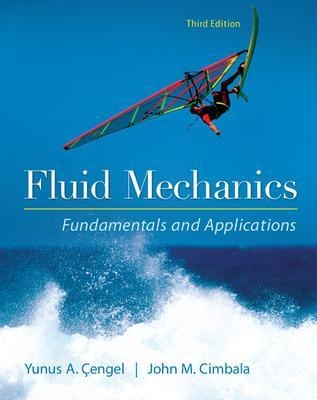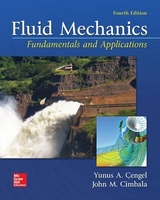
Fluid Mechanics Fundamentals and Applications
McGraw Hill Higher Education (Verlag)
978-0-07-338032-2 (ISBN)
- Titel erscheint in neuer Auflage
- Artikel merken
Cengel and Cimbala's Fluid Mechanics Fundamentals and Applications, communicates directly with tomorrow's engineers in a simple yet precise manner. The text covers the basic principles and equations of fluid mechanics in the context of numerous and diverse real-world engineering examples. The text helps students develop an intuitive understanding of fluid mechanics by emphasizing the physics, using figures, numerous photographs and visual aids to reinforce the physics. The highly visual approach enhances the learning of Fluid mechanics by students. This text distinguishes itself from others by the way the material is presented - in a progressive order from simple to more difficult, building each chapter upon foundations laid down in previous chapters. In this way, even the traditionally challenging aspects of fluid mechanics can be learned effectively.
McGraw-Hill's Connect, is also available as an optional, add on item. Connect is the only integrated learning system that empowers students by continuously adapting to deliver precisely what they need, when they need it, how they need it, so that class time is more effective. Connect allows the professor to assign homework, quizzes, and tests easily and automatically grades and records the scores of the student's work. Problems are randomized to prevent sharing of answers an may also have a "multi-step solution" which helps move the students' learning along if they experience difficulty.
Yunus A. ï¿engel is Professor Emeritus of Mechanical Engineering at the University of Nevada, Reno. He received his B.S. in mechanical engineering from Istanbul Technical University and his M.S. and Ph.D. in mechanical engineering from North Carolina State University. His areas of interest are renewable energy, energy efficiency, energy policies, heat transfer enhancement, and engineering education. He served as the director of the Industrial Assessment Center (IAC) at the University of Nevada, Reno, from 1996 to 2000. He has led teams of engineering students to numerous manufacturing facilities in Northern Nevada and California to perform industrial assessments, and has prepared energy conservation, waste minimization, and productivity enhancement reports for them. He has also served as an advisor for various government organizations and corporations. Dr. ï¿engel is also the author or coauthor of the widely adopted textbooks Differential Equations for Engineers and Scientists (2013), Fundamentals of Thermal-Fluid Sciences (5th ed., 2017), Fluid Mechanics: Fundamentals and Applications (4th ed., 2018), Thermodynamics: An Engineering Approach (9th ed., 2019), and Heat and Mass Transfer: Fundamentals and Applications (6th ed., 2020), and all published by McGraw Hill LLC Education. Some of his textbooks have been translated into Chinese (Long and Short Forms), Japanese, Korean, Spanish, French, Portuguese, Italian, Turkish, Greek, Tai, and Basq. Dr. ï¿engel is the recipient of several outstanding teacher awards, and he has received the ASEE Meriam/Wiley Distinguished Author Award for excellence in authorship in 1992 and again in 2000. Dr. ï¿engel is a registered Professional Engineer in the State of Nevada, and is a member of the American Society of Mechanical Engineers (ASME) and the American Society for Engineering Education (ASEE). John M. Cimbala is Professor of Mechanical Engineering at The Pennsylï¿vania State University (Penn State), University Park, PA. He received his B.S. in Aerospace Engi-neering from Penn State and his M.S. in Aeronautics from the California Institute of Technology (CalTech). He received his Ph.D. in Aeronautics from CalTech in 1984. His research areas include experimental and computational fluid mechanï¿ics and heat transfer, turbulence, turbulence modeling, turbomachinery, indoor air quality, and air pollution control. Professor Cimbala completed sabbatical leaves at NASA Langley Research Center (199394), where he advanced his knowledge of computational fluid dynamics (CFD), and at Weir American Hydro (201011), where he performed CFD analyses to assist in the design of hydroturbines. Dr. Cimbala is the author or coauthor of dozens of journal and conference papers and is the coauthor of four other textbooks: Indoor Air Quality Engiï¿neering: Environmental Health and Control of Indoor Pollutants (2003), pubï¿lished by Marcel-Dekker, Inc.; Essentials of Fluid Mechanics (2008); Fundamentals of Thermal-Fluid Sciences (5th ed., 2017), and Fluid Mechanics: Fundamentals and Applications (4th ed., 2018), all published by McGraw Hill LLC. He has also contributed to parts of other books, and is the author or coauthor of dozens of journal and conference papers. He has also recently ventured into writing novels. More information can be found at www.mne.psu.edu/cimbala. Professor Cimbala is the recipient of several outstanding teaching awards and views his book writing as an extension of his love of teaching. He is a member and Fellow of the American Society of Mechanical Engineers (ASME). He is also a member of the American Society for Engineering Education (ASEE), and the American Physical Society (APS).
1) Introduction and Basic Concepts
2) Properties of Fluids
3) Pressure and Fluid Statics
4) Fluid Kinematics
5) Bernoulli and Energy Equations
6) Momentum Analysis of Flow Systems
7) Dimensional Analysis and Modeling
8) Internal Flow
9) Differential Analysis of Fluid Flow
10) Approximate Solutions of the Navier-Stokes Equation
11) External Flow: Drag and Lift
12) Compressible Flow
13) Open-Channel Flow
14) Turbomachinery
15) Introduction to Computational Fluid Dynamics
Appendices
1) Property Tables and Charts (SI Units)
2) Property Tables and Charts (English Units)
| Erscheint lt. Verlag | 16.2.2013 |
|---|---|
| Zusatzinfo | 1400 Illustrations, unspecified |
| Verlagsort | London |
| Sprache | englisch |
| Maße | 211 x 262 mm |
| Gewicht | 1814 g |
| Themenwelt | Naturwissenschaften ► Physik / Astronomie ► Strömungsmechanik |
| Technik ► Fahrzeugbau / Schiffbau | |
| Technik ► Maschinenbau | |
| Technik ► Umwelttechnik / Biotechnologie | |
| ISBN-10 | 0-07-338032-6 / 0073380326 |
| ISBN-13 | 978-0-07-338032-2 / 9780073380322 |
| Zustand | Neuware |
| Haben Sie eine Frage zum Produkt? |
aus dem Bereich



